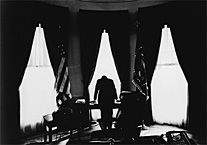Brendan Greeley of Public Radio Exchange kicked off the morning session at the Berkman blogging conference by giving a presentation on the convergence of podcasting with public broadcasting.
Podcasting was Dave Winer's idea, he explained: to add new code to RSS feeds so that they could help Internet users subscribe to audio blogs and have those blogs downloaded directly to their MP3 player.
"I think that public radio and the people producing podcasts are heading in the same direction," he said. Public radio people know how to make quality programming, but are just learning about the role the Internet can play as a dissemination tool. Podcasters are still learning how to create quality programming. "You can still hear podcasters sometimes say 'Is this thing on?'"
Everyone in public radio talks about "new voices," Brendan noted. Everybody agrees the notion of new voices is a good idea, he said, but the system is stacked against it.
Public radio has grown since 9/11 because it engenders trust. "Though it's used by some farmers to keep their cows mellow."
"When what you do has been mocked in a skit on Saturday Night Live, it's time to set down and think about what you do."
Public radio is similar to blogging in the sense that it has a community of people who feel they have a vested interest around it.
He played an example of an experimental show by Garrison Keillor on Public Radio Exchange. He started with a warning from Keillor saying that you can't republish or rebroadcast, then a conversation about the band Evanescence and their annoying "quasi-Christian" sound. The program was a flop. No one ran it. Critics said the people in the program weren't experts or known quantities, which was seen as counter to public broadcasting culture.
Now they're podcasting - "Zero barrier to entry." The quality of software available for free now makes it possible to record podcasts with excellent production value -- no studio investments required.
He talked about Adam Curry, who co-founded podcasting with Dave Winer. Listening to Adam, he'll talk for a while then walk away from the mic to let his dogs out of the house or talk with his plumber in Dutch. Greeley said that he sees this as more authentic in many ways, because Adam and other podcasters seem like real people. He also played the Tap Dancer Podcast News, a woman tapdancing to a piano while talking about the latest political headlines, and a clip from the Dawn and Drew show.
It might seem easy for journalists to dismiss programming like this, he said, but then again, Howard Stern became a huge media personality because his audience saw him as authentic, as a real person.
So where do public radio and podcasting meet? Podcasting will lower the barriers to entry into public radio, as more podcasters find their voice. "It's possible now to start producing a podcast... and when there's enough demand, you can present yourself to a broadcaster, and say, 'I come with this audience.'"



 Public radio host Christopher Lydon, referring to the famous photo of JFK leaning over his Oval Office desk with his head down, told a story of how the photo was actually taken. NY Times photographer George Tames went to the White House, scheduled to take an official photo of President Kennedy. He arrived at the Oval Office, finding JFK leaning against his desk. Because of the president's back injury, he found it more comfortable to stand over his desk and lean down, putting the weight on his shoulders so he could do things like reading the paper. At that particular moment, JFK was reading the NY Times op-ed page, in particular a column by Arthur Krock. Tames immediately snapped two pictures, then went over to the president.
Public radio host Christopher Lydon, referring to the famous photo of JFK leaning over his Oval Office desk with his head down, told a story of how the photo was actually taken. NY Times photographer George Tames went to the White House, scheduled to take an official photo of President Kennedy. He arrived at the Oval Office, finding JFK leaning against his desk. Because of the president's back injury, he found it more comfortable to stand over his desk and lean down, putting the weight on his shoulders so he could do things like reading the paper. At that particular moment, JFK was reading the NY Times op-ed page, in particular a column by Arthur Krock. Tames immediately snapped two pictures, then went over to the president.


